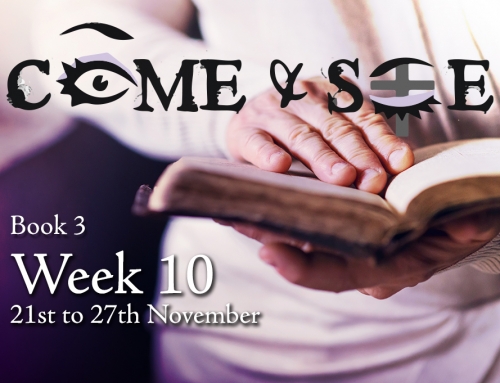Week 6
Monday 24 October
Read Matthew 3:13-17
Even John the Baptist thought that Jesus’ baptism was odd and remonstrated with Jesus – Jesus was sinless and needed no baptism of repentance, he was the one who came to baptise in the Holy Spirit, why would he need a water baptism by John. It did not make sense – but yet it did.
Christ, who was conceived of the Holy Spirit, at his baptism God gives public confirmation that he is filled by him always – the Spirit descends, and a voice is heard ‘This is my beloved Son, with whom I am well pleased.’ The accreditation is not simply John’s but God’s. For those earliest disciples, Andrew, Peter, John and Philip this was what made them leave John the Baptist and go with Jesus – God is all over him. This too is what attracts us to Jesus – his authentication as God is simply undeniable when you meet him. There are hundreds of questions till you meet him, then there are none because his very presence removes the questions.
But secondly, Jesus in allowing himself to be baptised demonstrates the second truth – he wears his position lightly. He submits to John’s baptism – as later he will submit to the cross. “He came not to be served but to serve.”[1]
Here we have a double role model – as Christian we have God’s Spirit living in us and we are ‘God’s beloved children with whom (in Christ) he is well pleased’ but we must wear it lightly – here to serve, and to submit to one another in Christ.[2]
[1] Mark 10:45
[2] Ephesians 5:21
Tuesday 25 October
Read John 1:19-34
This is John’s account of Jesus’ Baptism though, somehow, he omits the actual baptism, assuming his readers know what was going on![1] The fascinating fact that appears here is that John (although a second cousin of Jesus) did not know him but was reliant on the authentication we talked of yesterday. They presumably had not seen each other since pre-birth or childhood – but God made clear who he was – The one who will baptise with the Holy Spirit.
A lot of controversy has swirled round this phrase (and a lot of often heated nonsense been written and spoken). Its interpretation has divided the churches into pentecostal or charismatic (and some into neither of these but simply asleep). The scripture is clear – every Christian has the Spirit of God dwelling in him. He may quench the Spirit[2] by disobedience, open sin, or simply ignoring the Spirit’s voice within. He (or she)
needs to ‘go on being filled with the Spirit’[3] not just once but over and over again.
The Spirit is God’s power source – too often we run on batteries charged up a long time ago and now running low. There is mains power available all day every day as we open ourselves to the constant partnership that scripture envisages – ‘I, yet not I, but Christ living in me!’[4]
[1] He does the same about the Last Supper, giving all the conversation at the table but leaving out the actual meal see Chapter 13.
[2] 1 Thessalonians 5:19
[3] Ephesians 5:18 Greek has two forms of the imperative. The present imperative which this is means ‘to go on doing something’ whilst the aorist means ‘do it!’
[4] Galatians 2:20
Wednesday 26 October
Read Matthew 5:7
Mercy is often overlooked. Sometimes it is seen as weakness, or downright foolishness. He doesn’t deserve it (is our attitude). But then neither did we!
Today take time to recognise the mercy you have received and ask God to show you the situations in which you need to show it. They may be family situations or work ones or even church ones – but go on and be merciful it will bring blessing to you too.
Thursday 27 October
In Shakespeare’s Merchant of Venice, Shylock the money lender demands literally ‘the pound of flesh’ he was foolishly offered. Portia asks him for mercy and he asks “On what compulsion must I?”
Her response is our reading for today:
The quality of mercy is not strained.
It droppeth as the gentle rain from heaven
Upon the place beneath. It is twice blest:
It blesseth him that gives and him that takes.
‘Tis mightiest in the mightiest; it becomes
The throned monarch better than his crown.
His sceptre shows the force of temporal power,
The attribute to awe and majesty,
Wherein doth sit the dread and fear of kings.
But mercy is above this sceptred sway;
It is enthroned in the hearts of kings;
It is an attribute of God himself;
And earthly power doth then show like God’s
When mercy seasons justice.
Psalm 85 speaks of God’s intervention in response to mankind’s agony in these terms:
“Mercy now and Justice meet Truth and grace for aye embrace”[1]
Mercy is the outward expression of the indwelling Spirit – it is the visible sign of grace within. Ponder this today – Is God’s grace and his indwelling Spirit evident in my actions and attitudes?
[1] From the metrical version of the 85th Psalm in the Irish Psalter
Friday 28 October
Read Romans 12:1-2
Here Paul adds his plea that God’s mercy has sway in us. Here it is a plea that we allow his mercy to change our attitudes, our inner thinking and even the way we use (or abuse) our bodies. Every one of the Beatitudes is a call to counter-cultural living – to answering in the opposite coin. None more so than letting the mercy of God reshape our thinking and our acting. It will amaze and confound those around you. Try it!
Saturday 29 October
A day for rest and reflection or catching up on reading missed earlier in the week.
You may want to reflect on these questions along with the weekly reading:
- What does it mean to me that I have been baptized? (If you haven’t, what holds you back from baptism?)
- What does it mean to be baptized with the Holy Spirit?
- Do you treat people as they deserve or have you discovered the liberating attitude of mercy?
- How does your thinking need to be transformed?
For Children:
Talk with your children about their baptism – tell them where it happened, who came for it, and what it meant for you. Tell them that it means they are already part of Jesus family and therefore they are to live the way Jesus did.
Do they feel part of the church family? What does it mean to be part of the church family?







